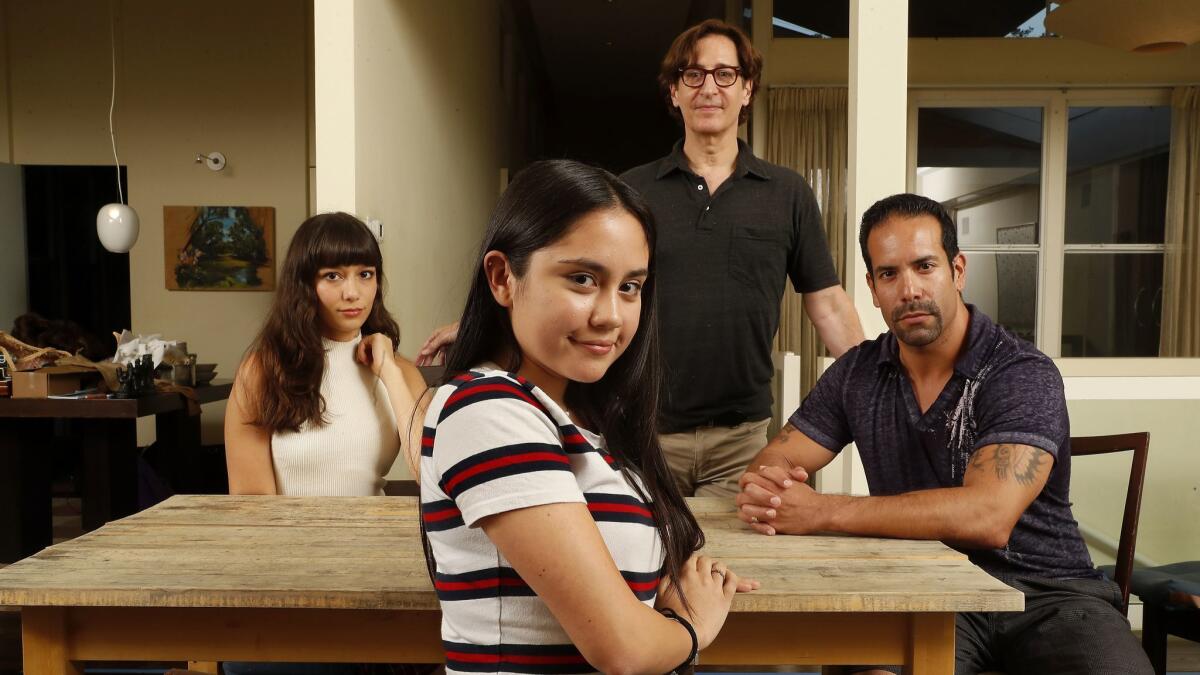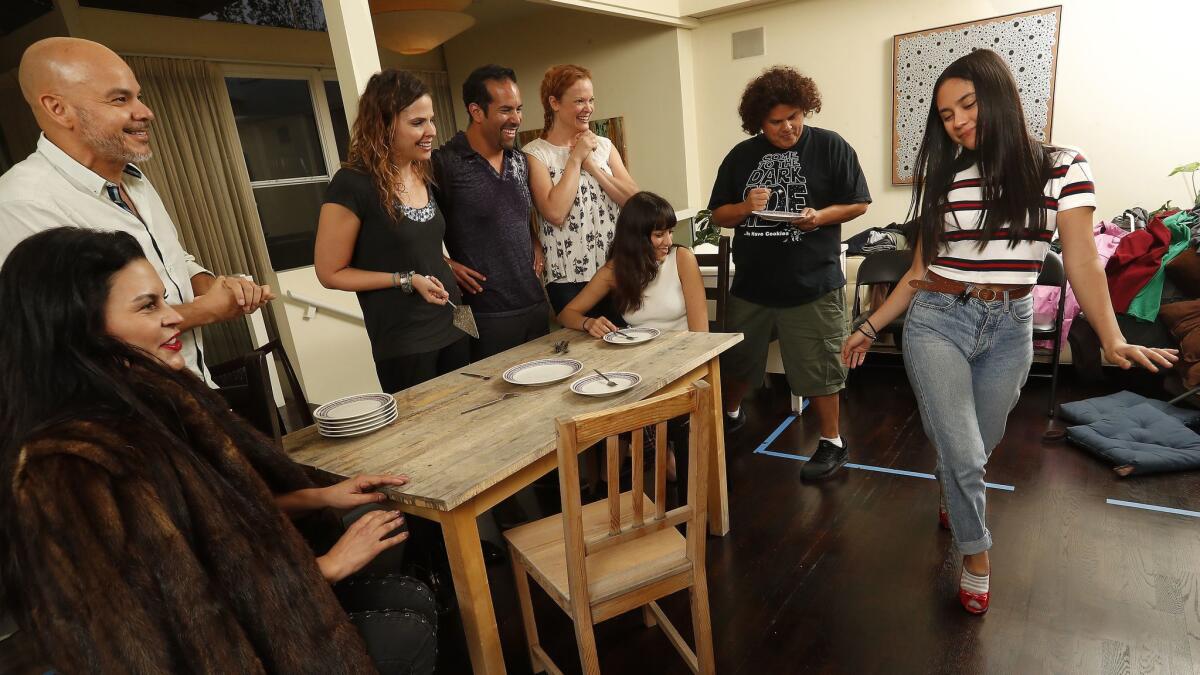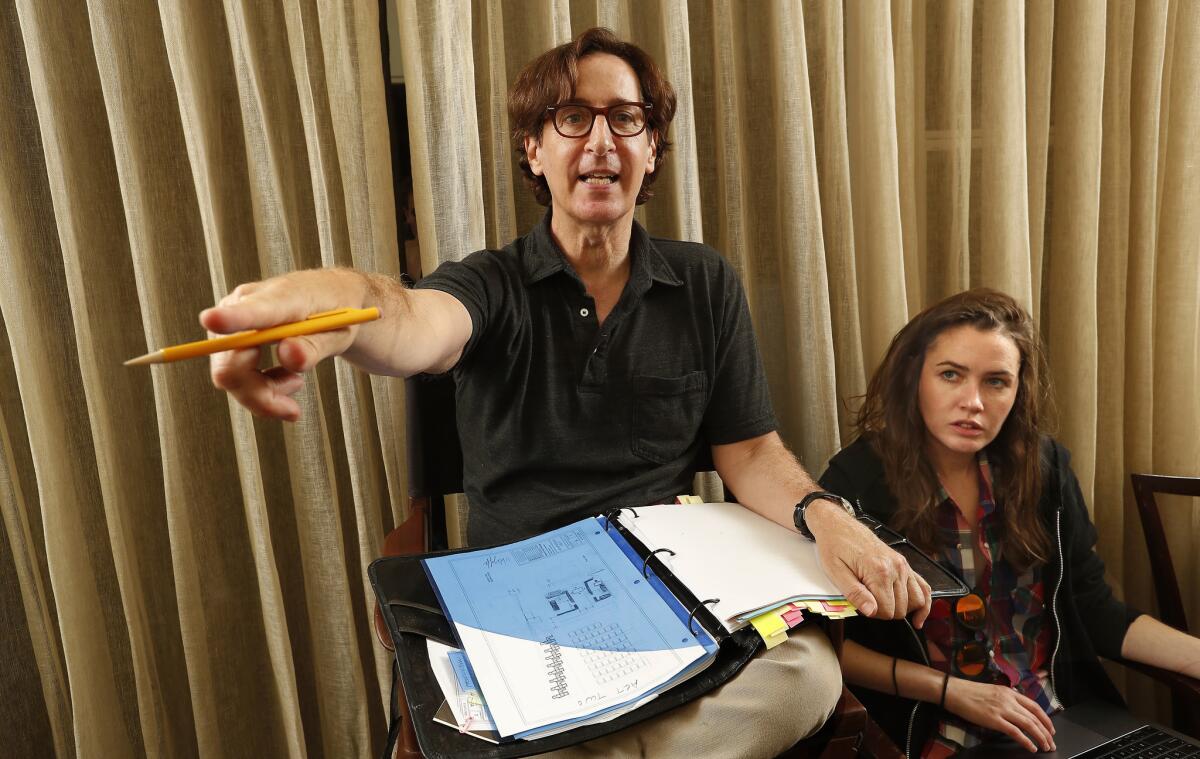With a mostly Latino cast, ‘Diary of Anne Frank’ brings a new vision — and some controversy — to the classic play

- Share via
On a recent Monday evening, a group of actors filed into director Stan Zimmerman’s airy Hollywood home, greeting each other with hugs and kisses before launching into an hours-long rehearsal. Like most days for the past month, they were preparing for an intimate theater staging of the classic play, “The Diary of Anne Frank.”
Opening Thursday at the 50-seat Dorie Theatre, the production is the stage adaptation of “The Diary of a Young Girl” by Anne Frank. It’s the oft-told story of a Jewish teenager who chronicled her life between the ages of 13 and 15 after being forced into hiding to escape persecution from Nazis. The original play, which premiered in 1955, was adapted from the diary and written by Frances Goodrich and Albert Hackett.
Zimmerman’s production is based on the 1997 adaptation by Wendy Kesselman, which incorporated newly discovered writing in the diary. But his version of the play has a twist — the cast is predominantly Latinx.
Because of the cost-prohibitive nature of independent theater, Zimmerman hosts rehearsals in his living room, rolling up his rug and using his couch as a makeshift costume closet. His dark wood floors are lined with blue tape to give the actors an approximation of the space they’ll have onstage and marks out the claustrophobic space Anne Frank and her family shared with the Van Daans, the pseudonymous name for another Jewish family in hiding.
A few minutes after arriving, the actors began rehearsing a tense scene in which Mr. and Mrs. Van Daan have a fierce argument about whether to sell an expensive fur coat. Then they break, some actors practicing their lines or discussing stage notes in both English and Spanish, their voices quickly filling the room. Despite the serious nature of the play, one actor said rehearsals were always lively.
“Of course [they are],” said Aris Alvarado, an understudy for the play’s Mr. Dussell.

Zimmerman, a comedy writer whose credits include the original “Roseanne” and “Gilmore Girls,” never imagined he’d be directing work that confronts the devastating realities of the Holocaust. But feeling dejected after the 2016 presidential election, the director found a way to use his art to make a statement after reading a CNN story that connected past atrocities with present-day realities for many immigrants in the U.S.
“Immediately, I went to pull the ‘Diary of Anne Frank,” Zimmerman says. “All of a sudden a light bulb went off. What if I cast everyone in the attic with Latinx actors … that could be really interesting.”
The CNN article examines the real-life story of a Jewish woman in L.A. who signed an apartment lease as a cover for an immigrant mother and her two high school-aged daughters after their father was deported by the U.S. Immigration and Customs Enforcement (ICE). The woman, who is unnamed in the story, is involved with an underground interfaith network that gives shelter to hundreds of people across Southern California called LA Voice.
Armed with an idea, Zimmerman says the pieces fell into place quickly. Securing the rights to the play, a process that can take up to three weeks, took only a day. A former acting student, Anne Kathryn Parma, offered to help produce the play after hearing about the idea.
And there were other fortuitous signs that the production was meant to be: like a donated fur coat from a Holocaust survivor and rehearsals coinciding with anniversaries in the Frank story.
“I’ve never seen such outpouring as far as the theater community,” Zimmerman says.
But as word began to spread about the play, intense backlash soon followed.
Anne’s father tried to get their family to America, but because of strict immigration laws they were not allowed here.
— Stan Zimmerman, director of “The Diary of Anne Frank”
Zimmerman says that original artwork for the play, which prominently features an ICE officer, may have contributed to false reports by conservative outlets that the director planned to change Nazis into ICE agents. Even though the play is a word-for-word production of Kesselman’s script, the director has been overwhelmed with disparaging and racist messages.
“I’ve been called a Nazi, I’ve been called a Holocaust denier,” Zimmerman says. “This just brings a new perspective to it … when you hear words in the script like ‘deported’ or wall,’ it does have extra meaning.”
And in doing more research on the Frank family, Zimmerman found another startling connection. “Anne’s father tried to get their family to America, but because of strict immigration laws they were not allowed here,” he says. “To think, she could still be alive today if we had let their family in.”

As a Jewish creative, Zimmerman is sensitive to reservations about the production. He received an email from a Jewish friend opposed to the idea of casting Latinx actors. But after explaining his concept, the friend changed his mind.
“The connection I’m making is that there were safe houses in Amsterdam and there’s safe houses here,” Zimmerman says. “I’m not saying the immigrant situation is the same as the Holocaust, that would be insane.”
Teddi Shaffer plays Margot Frank and is both Jewish and Mexican. The actor had questions when she saw the casting call looking for Hispanic actors. “You don’t want to get in a project or something that you don’t believe in and that you think could be offensive or offend you,” Shaffer says. “Once I understood Stan’s vision, I was super excited about it and knew it was going to create a great positive dialogue.”
On a weekend visit to a Holocaust museum, the cast spoke with a survivor and made deeper connections with their roles. Genesis Ochoa, the 15-year-old actor who plays Anne, found another connection while looking through a gallery of family photos at the museum.
“One picture I saw of a brother and a sister said they were perished and lost without a trace at the [concentration] camp,” Ochoa said. “It really stuck out to me because kids are getting lost in the system now.”
The unique production isn’t just getting resistance though, others have found it necessary in polarized political times. “A lot of people [are] giving us the big thumbs up, the ‘way to go,’ that this needs to be told,” actor Emiliano Torres says.
Rev. Zach Hoover, executive director of LA Voice, was surprised and honored to get a call about the stage production inspired by the organization’s safe house network. He called Zimmerman and the cast’s work courageous.
“Art, including music and theater and street art … has a really important role to play in stories and images and metaphors that help us get in touch with our shared humanity,” Hoover says. “The point of art is to say that there [are] some parallels here and there’s some discomfort we need to experience.”
Like a scene in the play where Anne slips on a pair of red heels, Zimmerman hopes audiences can step into someone else’s shoes and use the play to take in a fresh perspective. The director and cast are especially looking forward to post-show discussions.
“The people that throw out derogatory comments, the people that are up in arms about this, hopefully they do come see the show,” Torres says. “Then we can have a constructive, healthy conversation and we can listen to each other.”
------------
“The Diary of Anne Frank”
When: Thursday-Sept. 23
Where: Dorie Theatre (6476 Santa Monica Blvd., LA)
Tickets: $25 online, $30 at the door
Info: www.brownpapertickets.com
More to Read
The biggest entertainment stories
Get our big stories about Hollywood, film, television, music, arts, culture and more right in your inbox as soon as they publish.
You may occasionally receive promotional content from the Los Angeles Times.











